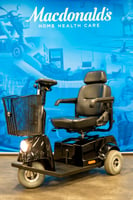Discover the numerous benefits that mobility scooters offer to seniors in enhancing their quality...
Choosing the Right Wheelchair
Finding the perfect wheelchair is essential for mobility and comfort. Learn how to choose the right wheelchair for your needs.
Understanding Wheelchair Measurements
When choosing the right wheelchair, it's important to understand the various measurements that are involved. These measurements include seat depth and width, backrest height, and floor to seat height.
Seat depth and width are crucial for ensuring a proper fit. The seat should be wide enough to accommodate the user comfortably, and the depth should provide enough support for the user's legs without restricting movement.
The backrest height is another important measurement to consider. It should provide adequate support for the user's back, ensuring proper posture and preventing discomfort.
Finally, the floor to seat height is essential for ease of transferring in and out of the wheelchair. It should be at a level that allows the user to comfortably reach the ground or other surfaces.
Consulting with an Occupational Therapist
Working with an occupational therapist is highly recommended when choosing the right wheelchair. An occupational therapist can assess the user's specific needs and recommend a wheelchair that will best meet those needs.
They can help determine the appropriate measurements for the seat depth and width, backrest height, and floor to seat height. They can also consider any injuries or medical issues that may impact the user's comfort and mobility.
Additionally, an occupational therapist can provide guidance on the type of wheelchair that would be most suitable, whether it's a manual wheelchair or a power wheelchair. They can also assist with exploring range of motion expectations and budget considerations.
Overall, consulting with an occupational therapist ensures that the wheelchair chosen is tailored to the user's individual requirements, promoting optimal mobility and comfort.
Determining Lifestyle and Mobility Needs
To choose the right wheelchair, it's important to consider the user's lifestyle and mobility needs. Questions to ask include:
- Will the wheelchair be used only indoors, or outdoors as well?
- How much of the day will be spent in the wheelchair?
- What type of activities does the user expect to be able to complete in the wheelchair?
- Does the user have any injuries or medical issues that would make using a standard wheelchair uncomfortable?
By answering these questions, the user can gain a better understanding of the specific requirements their wheelchair should fulfill. This will ensure that the chosen wheelchair supports their desired lifestyle and promotes independence.
Considering Transportation and Storage
Transportation and storage are important factors to consider when choosing a wheelchair. If the user needs to transport the wheelchair in a car, it's essential to find a wheelchair that is lightweight and easy to fold or disassemble.
Additionally, the size and weight of the wheelchair should be suitable for storage in the user's home. It's important to ensure that there is enough space to safely store the wheelchair when it's not in use.
By considering transportation and storage needs, the user can choose a wheelchair that is convenient and practical for their lifestyle.
Exploring Manual vs. Power Wheelchair Options
One of the important decisions to make when choosing a wheelchair is whether to opt for a manual wheelchair or a power wheelchair.
A manual wheelchair is propelled by the user or a caregiver, using the user's upper body strength. It offers more control and is often lighter and more compact than a power wheelchair. It is suitable for users with good upper body strength and coordination.
On the other hand, a power wheelchair is motorized and operated by a joystick or other control mechanism. It requires less physical effort from the user and is ideal for individuals with limited upper body strength or mobility.
Exploring the pros and cons of both options, considering the user's range of motion expectations, and consulting with an occupational therapist can help determine whether a manual or power wheelchair is the best choice.
It's also important to consider the budget for the wheelchair. Some insurance plans may cover the cost of the wheelchair, while others may require out-of-pocket expenses. Understanding the available budget will help in making an informed decision.

